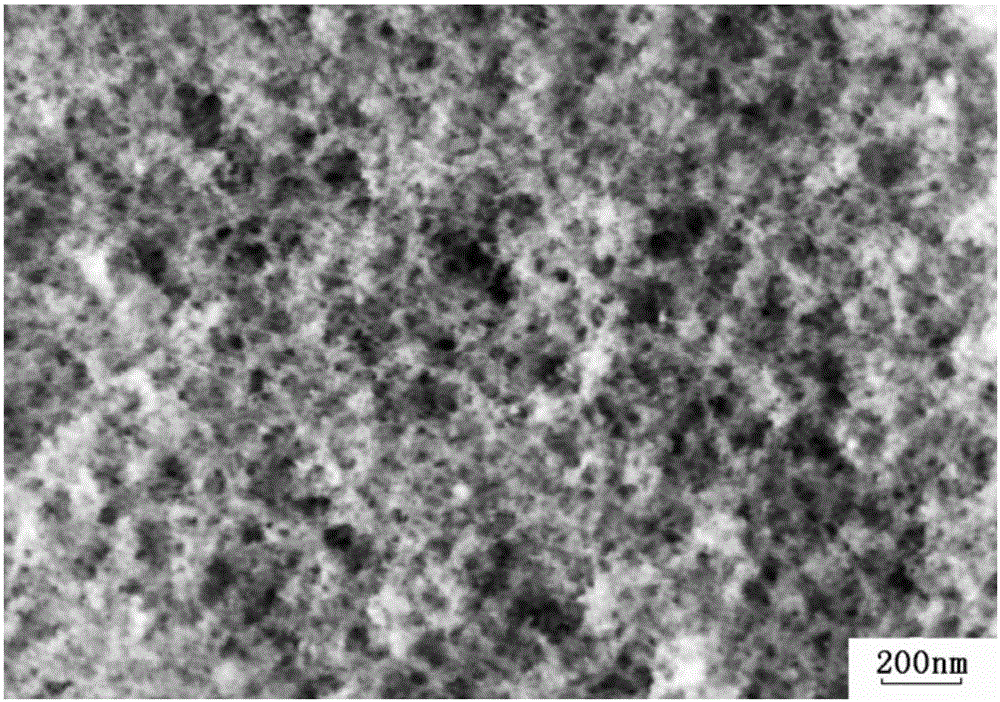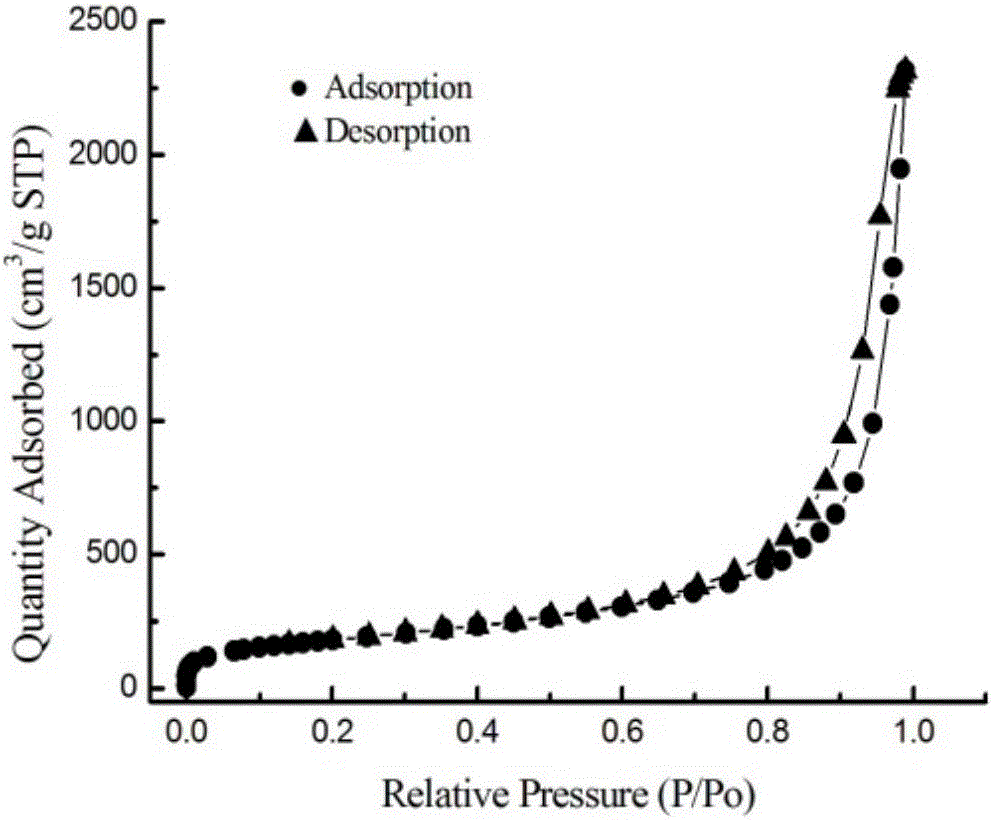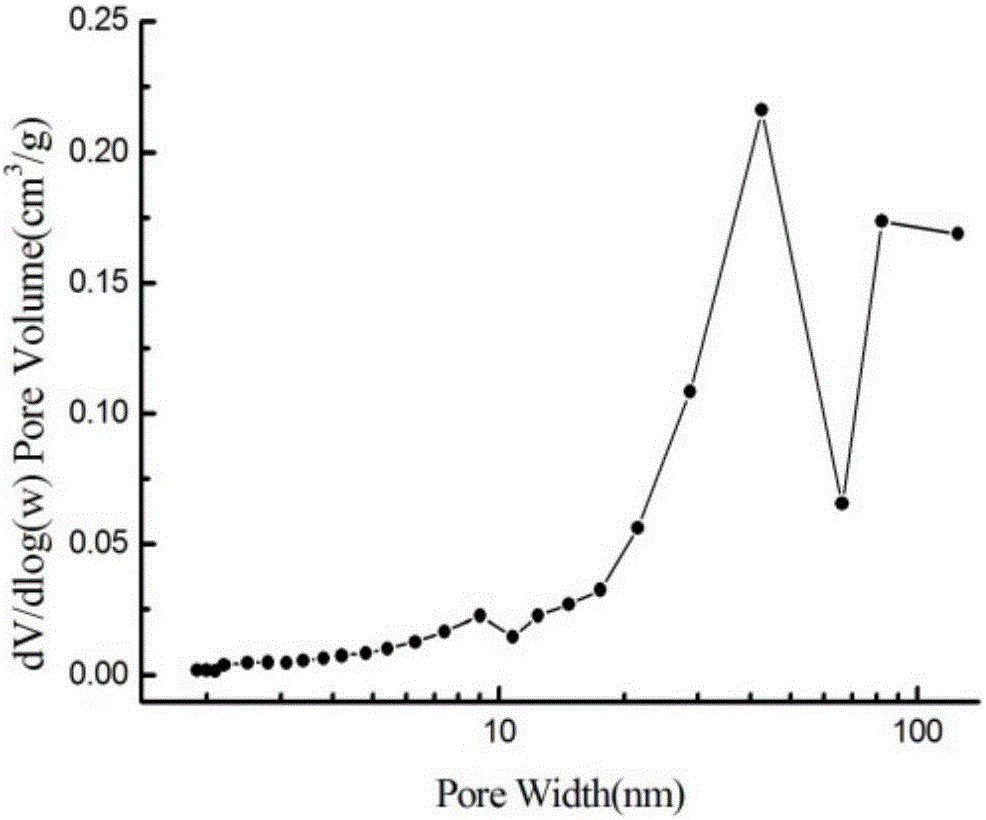a tio 2 nanotube/sio 2 Airgel composite photocatalytic material and preparation method thereof
A photocatalytic material and nanotube technology, applied in chemical instruments and methods, physical/chemical process catalysts, colloidal chemistry, etc., can solve the problems of high semiconductor carrier load rate, small size of titanium nanotubes, low catalytic efficiency, etc. , to achieve the effects of improved photocatalytic activity and photocatalytic utilization, excellent adsorption performance, and large specific surface area
- Summary
- Abstract
- Description
- Claims
- Application Information
AI Technical Summary
Problems solved by technology
Method used
Image
Examples
Embodiment 1
[0034] Step 1. Mix titanium dioxide (P25) and 10mol / L NaOH aqueous solution, then add it into an autoclave with a polytetrafluoroethylene liner and stir it evenly, then seal the autoclave and place it in an oven. The temperature was raised from room temperature to 120° C. at a rate of 2° C. / min and kept for 2 days. After the reaction was completed, the autoclave was naturally cooled to room temperature in an oven to obtain a reaction solution. Wherein, the mass ratio of titanium dioxide to NaOH in NaOH solution is 1:12.
[0035] Step 2: Separating the reaction liquid to obtain a white precipitate, adding 0.2 mol / L hydrochloric acid to the white precipitate to acidify, and magnetically stirring for 2 hours, when the pH value is 6, washing with secondary deionized water until neutral, and then centrifuged to obtain a precipitate, which was dried at 80°C to obtain a solid powder;
[0036] Step 3: Calcining the solid powder at 400°C for 2 hours in an argon atmosphere, and then gr...
Embodiment 2
[0043] Step 1. Mix titanium dioxide (P25) and 10mol / L NaOH aqueous solution, then add it into an autoclave with a polytetrafluoroethylene liner and stir it evenly, then seal the autoclave and place it in an oven. The temperature was raised from room temperature to 120° C. at a rate of 2° C. / min and kept for 2 days. After the reaction was completed, the autoclave was naturally cooled to room temperature in an oven to obtain a reaction solution. Wherein, the mass ratio of titanium dioxide to NaOH in NaOH solution is 1:12.
[0044] Step 2: Separating the reaction liquid to obtain a white precipitate, adding 0.2 mol / L hydrochloric acid to the white precipitate to acidify, and magnetically stirring for 2 hours, when the pH value is 6, washing with secondary deionized water until neutral, and then centrifuged to obtain a precipitate, which was dried at 80°C to obtain a solid powder;
[0045] Step 3: Calcining the solid powder at 550°C for 2 hours in an argon atmosphere, and then gr...
Embodiment 3
[0057] Step 1. Mix titanium dioxide and 10mol / L NaOH aqueous solution, then add it into an autoclave with a polytetrafluoroethylene liner and stir it evenly, then seal the autoclave and place it in an oven, from room temperature to The temperature was raised to 160° C. at a rate of 2° C. / min and kept for 2 days. After the reaction was completed, the autoclave was naturally cooled to room temperature in an oven to obtain a reaction liquid. Wherein, the mass ratio of titanium dioxide to NaOH in NaOH solution is 1:8.
[0058] Step 2: Separating the reaction liquid to obtain a white precipitate, adding 0.2 mol / L hydrochloric acid to the white precipitate to acidify, and magnetic stirring for 3 hours, when the pH value is 4, wash with deionized water twice to neutrality, and then centrifuged to obtain a precipitate, and dried the precipitate at 60°C to obtain a solid powder;
[0059] Step 3: Calcining the solid powder at 600°C for 2 hours in a nitrogen atmosphere, and then grindin...
PUM
| Property | Measurement | Unit |
|---|---|---|
| specific surface area | aaaaa | aaaaa |
| pore size | aaaaa | aaaaa |
| specific surface area | aaaaa | aaaaa |
Abstract
Description
Claims
Application Information
 Login to View More
Login to View More - R&D
- Intellectual Property
- Life Sciences
- Materials
- Tech Scout
- Unparalleled Data Quality
- Higher Quality Content
- 60% Fewer Hallucinations
Browse by: Latest US Patents, China's latest patents, Technical Efficacy Thesaurus, Application Domain, Technology Topic, Popular Technical Reports.
© 2025 PatSnap. All rights reserved.Legal|Privacy policy|Modern Slavery Act Transparency Statement|Sitemap|About US| Contact US: help@patsnap.com



